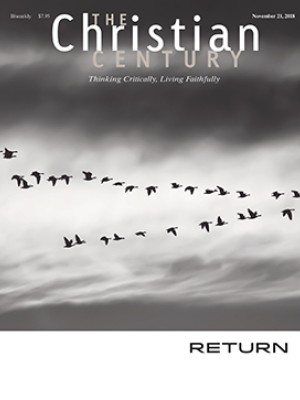December 23, Advent 4C (Luke 1:39-55)
Motherhood and ministry are intertwined for me.
On the day of my ordination, I felt my unborn daughter kick for the first time. I wish I could say that my awareness of her tiny movements began as I recited the vow to serve God “with energy, intelligence, imagination, and love”—or that she somersaulted in utero as I knelt beneath the weight of the laying on of hands. Instead, her fetal dance moves made their debut a few hours before the ordination service, while I ironed the wrinkles out of my brand new red stole. Those tiny kicks turned ironing into holy work as I marveled at a single day so pregnant with new beginnings.
Motherhood and ministry have intertwined for me ever since. I am a mother, and because of the depth of the bonds I share with my children, I cannot read or interpret the Bible otherwise. I am drawn to its mothers—named and unnamed, those whose stories are woven into the biblical narrative and those whose stories are hidden between its lines. I weep with Hagar as she fears her son Ishmael will die in the desert (Gen. 21:16). I sing praise with the psalmist who compares her contented soul to the disposition of a child who has nursed to its fill (Ps. 131:2). I demand justice alongside the Syrophoenician woman who begs Jesus to heal her daughter (Mark 7:26, Matt. 15:22). And, especially during Advent, I rejoice with Elizabeth and Mary as they await the births of John and Jesus in this week’s reading from the Gospel of Luke.
Read our latest issue or browse back issues.
Reading this passage, we often zero in on the Magnificat, through which Mary echoes Hannah’s song of thanksgiving at the dedication of Samuel to the Lord (1 Sam. 2). Mary’s song recalls not only the arc of salvation history but also the tendency of Israel’s God to turn the world’s order on its head. Her confession soars with the music of gratitude and deep faith that magnifies what God has done, is doing, and will do. With its poetic proclamation of God’s love made manifest, the Magnificat deserves our attention—but there remain other treasures to be mined from this passage.
The first is Mary’s urgency. No doubt Gabriel’s announcement still hangs thick in the air when Mary goes “with haste” to find Elizabeth. Perhaps she needs to wonder aloud about her encounter with God’s messenger and share her joy with the only other person on earth she knows will understand. Perhaps she longs to hear every detail of Elizabeth’s experience—the long-awaited morning sickness and lower back pain, harbingers of Elizabeth’s freedom from the ridicule of neighbors and relatives. Perhaps she yearns to tell her own story word for angelic word, so that she herself can begin to process the divine miracle taking shape in her own being.
Whatever Mary’s reasons for swiftly making the journey, Elizabeth seems already to have been informed of Mary’s news. Before Mary can so much as greet Elizabeth, the child in Elizabeth’s womb leaps—an experience Elizabeth immediately shares with her young cousin, after hailing Mary as blessed among women and before exalting her faith in what the Lord had spoken. It is interesting to note that Elizabeth, no stranger to the barrenness that was at that time perceived as dishonorable, praises Mary not only for the conventional reason of having conceived a child but also for her obedience to God.
Immediately after the Magnificat comes this: “And Mary remained with her about three months and then returned to her home. Now the time came for Elizabeth to give birth, and she bore a son.” These words invite us to do some simple math. Twice Luke situates the beginning of this story in Elizabeth’s sixth month of her pregnancy. Then, the evangelist reports, Mary journeys to be with Elizabeth and stays about three months. These last verses could be read as chronological: Mary goes home just prior to John’s birth. But I cannot imagine she would do that. Luke doesn’t give throwaway details, so I hope that when he mentions the length of Mary’s stay, he means to point out that Mary is among the relatives who rejoice with the postpartum Elizabeth over John’s safe arrival and God’s great mercy.
Dramatic irony is also at play in this passage. Even at the outset of the angel’s announcement, and throughout the story of Mary and Elizabeth’s overjoyed encounter, most of us remember the gruesome deaths that lie at the other end of the lives of these promised babes. When Mary sings of God’s bringing the powerful down from their thrones, I cannot help but think of Herod’s foolish oath in Mark and Matthew’s accounts. By his own sworn words the king is bested by his wife, who prompts her daughter to ask for the head of John the Baptist. And when Mary’s voice praises the Lord for having lifted up the lowly, my mind swings unwillingly to the day her son, the washer of his disciples’ feet, will be lifted on the cross.
As a mother, my experience of the joy of Advent is thus tempered by the heartbreak to come. At the root of my own maternal hypervigilance—a condition that began even before I felt those first leaps within my womb—is a fear that harm will befall my children, mixed with an illusion that I have the power to stop it. I am not sure that Mary or Elizabeth was ever under any such illusion. They seem to know from the beginning that the energy, intelligence, imagination, and love of John and Jesus are mysterious gifts, claimed beyond the reach of their own arms.





